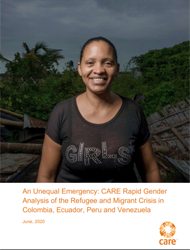 This combined Rapid Gender Analysis (RGA) provides information and observations on the different needs, capacities and coping strategies of Venezuelan women, men, and LGBTIQ+ individuals in Venezuela, Colombia, Ecuador and Peru. It seeks to understand how gender roles and relations have changed as a result of the crisis and share recommendations for how the humanitarian community can more effectively consider these changing dynamics to better meet the different needs of each group. It is based on a combination of primary and secondary data collection and analysis from each of the the 4 contexts through RGAs held over a 12 month period (2019-2020) – including focus group discussions and key informant interviews (KIIs). It was then updated with secondary data related to the onset of the COVID-19 pandemic.
This combined Rapid Gender Analysis (RGA) provides information and observations on the different needs, capacities and coping strategies of Venezuelan women, men, and LGBTIQ+ individuals in Venezuela, Colombia, Ecuador and Peru. It seeks to understand how gender roles and relations have changed as a result of the crisis and share recommendations for how the humanitarian community can more effectively consider these changing dynamics to better meet the different needs of each group. It is based on a combination of primary and secondary data collection and analysis from each of the the 4 contexts through RGAs held over a 12 month period (2019-2020) – including focus group discussions and key informant interviews (KIIs). It was then updated with secondary data related to the onset of the COVID-19 pandemic.
Key findings
- Venezuelans face a variety of protection risks, which increase significantly once they begin their migration journey. Many Venezuelan migrants and refugees travel through “irregular” means, and many face exploitation due to their lack of documentation.
- Women, girls and LGBTIQ+ individuals face elevated risks of gender-based violence (GBV), including by authorities. GBV survivors do not access necessary services, due to fear, shame, impunity, lack of knowledge of services, and mistrust in the system.
- Venezuelan migrants and refugees experience widespread xenophobia across Colombia, Ecuador and Peru. Xenophobia also limits access to basic services, including housing and employment. The hypersexualized perception of Venezuelan women and adolescent girls leaves them particularly vulnerable to sexual violence and exploitation.
- While the majority of Venezuelans interviewed live in a house that they own or that is owned by their partner, most Venezuelan migrants and refugees are living in rental accommodation, which is often overcrowded and unsanitary. Toilets and bathing facilities are generally communal and often unsafe, particularly for women and girls. • Venezuelan women, men, girls and boys struggle to find income-generating opportunities that are sufficient to meet their basic needs. Women and girls particularly are exposed to unsafe and exploitative working conditions, while men and boys are at risk of recruitment into criminal groups.